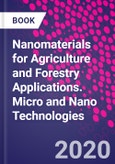Nanomaterials for Agriculture and Forestry Applications explores how major nanomaterials are being specially used in the agriculture, forestry, and other associated sectors. Plants and their products are used for synthesis of nanoparticles as they contain primary and secondary metabolites, which reduce the metal salts and metal oxides into their nanoparticles. Exposure of these particles has been examined for their sustainable role and/or interaction with agricultural crops in terms of growth and yields. Nanomaterials accumulation and translocation have shown interaction with cellular organelles, DNA, RNA, proteins, or other biomolecules; and affect various functions of cell organelles. Application of nanosensors holds a significant promise in monitoring signaling pathways, metabolism, detection of crop/soil diseases, and specific pollutants or pesticides. Nanomaterials have also been used in soil and water quality management. In forestry sector, the nanotechnology is considered as the potential platform, which can transform the forest materials into value-added products, such as smart paper, nano-packaging, coating material, building construction, and biomedical and other sectors. This book is an important resource, showing how nanotechnology is being used to enhance large-scale agricultural and/or industrial application and production.
Please Note: This is an On Demand product, delivery may take up to 11 working days after payment has been received.
Table of Contents
1. Introduction and techniques in nanomaterials formulation
2. Nanomaterials from non-wood forest products and their applications
3. Recent trends in isolation of cellulose nanocrystals and nanofibrils from various forest wood and nonwood products and their application
4. Nanomaterials from various forest tree species and their biomedical applications
5. Fabrication of nano-silica from agricultural residue and their application
6. Root-based fabrication of metal/metal-oxide nanomaterials and their various applications
7. Interactions of metal and metal-oxide nanomaterials with agricultural crops: an overview
8. Carbon-based nanomaterials and their interactions with agricultural crops
9. Behavior of agricultural crops in relation to nanomaterials under adverse environmental conditions
10. Holistic view for the safe use of nanomaterials at permissible level for plant production
11. Soil fertility and nutrient management with the help of nanotechnology
12. Nanomaterials and soil health for agricultural crop production: current status and future prospects
13. The ecology of nanomaterials in agroecosystems
14. Nanosensor platforms for surveillance of plant pathogens and phytometabolites/analytes vis-a` -vis plant health status
15. Nanosensors for root zone parameters influencing plant growth
16. Nanosensors for early detection of plant diseases
17. Role of nanomaterials in weed control and plant diseases management
18. Recent practices of medicinal and aromatic plants in nanotechnology
19. Nanotechnology for wood quality improvement and protection
20. Role of nanomaterials in soil and water quality management
21. Improving futuristic nanomaterial researches in forestry sector: an overview
Authors
Azamal Husen Foreign Delegate at Wolaita Sodo University, Wolaita, Ethiopia.Azamal Husen served as Professor and Head of the Department of Biology, University of Gondar, Ethiopia and is a Foreign Delegate at Wolaita Sodo University, Wolaita, Ethiopia. Previously, he was a Visiting Faculty of the Forest Research Institute, and the Doon College of Agriculture and Forest at Dehra Dun, India. Husen's research and teaching experience of 20 years includes biogenic nanomaterial fabrication and application, plant responses to nanomaterials, plant adaptation to harsh environments at the physiological, biochemical, and molecular levels, herbal medicine, and clonal propagation for improvement of tree species. Dr Husen contributed to R&D projects of World Bank, ICAR, ICFRE, JBIC etc. He has >250 publications . He is Series Co-Editor of 'Plant Biology, Sustainability and Climate Change', Elsevier.
Mohammad Jawaid United Arab Emirates University.Dr. Mohammad Jawaid is currently affiliated with the Department of Chemical and Petroleum Engineering at United Arab Emirates University. Previously he was a senior fellow (professor) in the Laboratory of Biocomposites Technology at the Institute of Tropical Forestry and Forest Products (INTROP), Universiti Putra Malaysia. He is an eminent scientist with more than twenty years of teaching, and research experience in composite materials. His research interests include hybrid reinforced/filled polymer composites, and advanced materials such as graphene/
nanoclay/fire retardant, lignocellulosic reinforced/filled polymer composites, and the modification and treatment of lignocellulosic fibres and solid wood, and nanocomposites and nanocellulose fibres.








